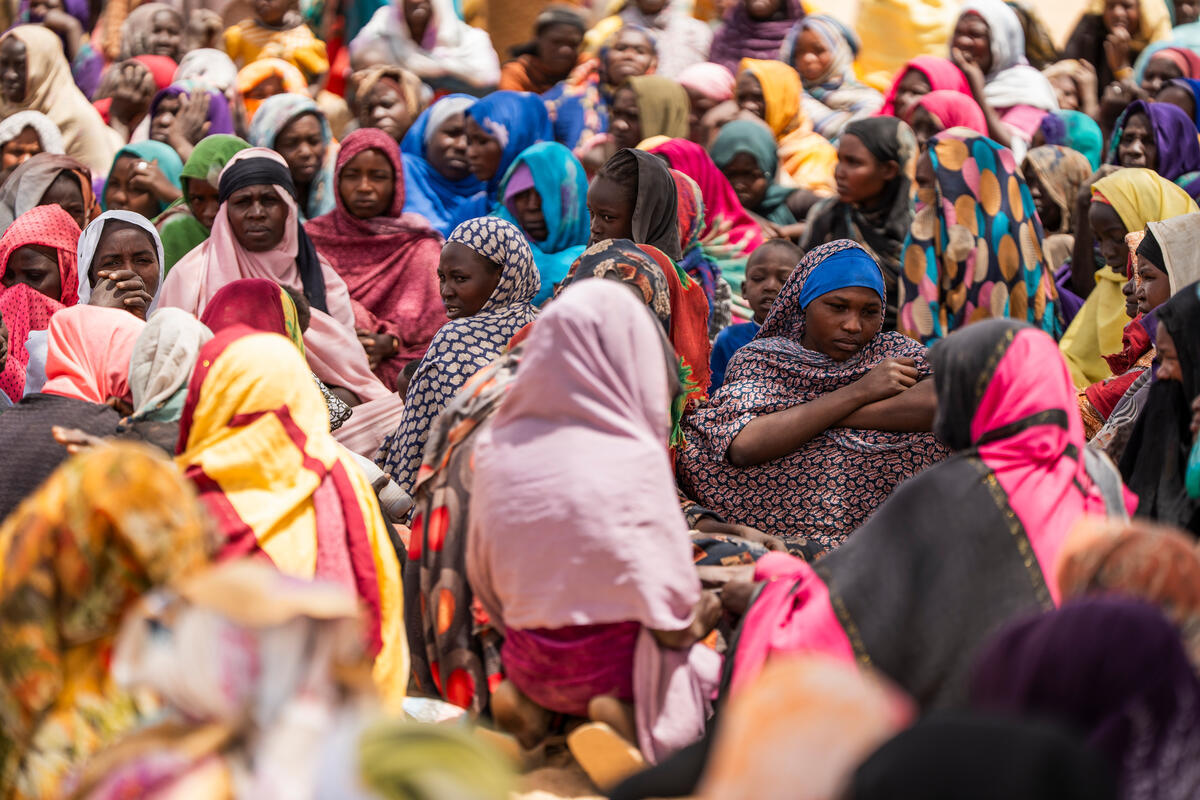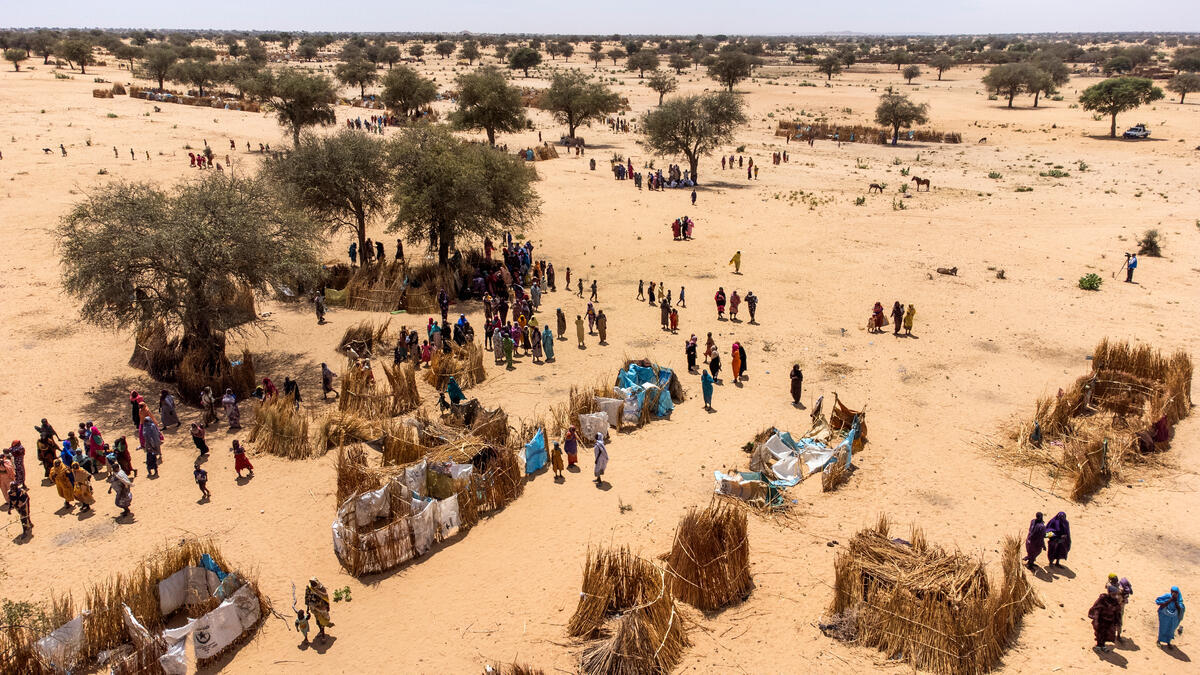As fighting rages in Sudan, refugee aid efforts expand to two new countries
As fighting rages in Sudan, refugee aid efforts expand to two new countries

Hanan Abdelmahmoud and her daughter, Amna, are among some 180,000 Sudanese refugees awaiting relocation from the border area in eastern Chad.
GENEVA – As the impact of the conflict in Sudan continues to spread, UNHCR, the UN Refugee Agency, and partners are seeking additional resources to support millions of people forced to flee.
Aid partners now require $1.5 billion, up from $1.4 billion in January, to assist and protect up to 3.3 million people forced to flee, as well as local communities in neighbouring countries, until the end of the year.
Two new countries, Libya and Uganda, have been incorporated into the regional refugee response, in addition to the Central African Republic (CAR), Chad, Egypt, Ethiopia and South Sudan.
In Libya, UNHCR has registered over 20,000 Sudanese refugees who have arrived in the country since April 2023, with estimates of many more having arrived in the East of the country. With more refugees continuing to arrive since the escalation of fighting in the Darfur region, local services available across the country are overstretched. Refugee families are being forced to sleep in the open as there is a lack of shelter. Medical facilities also cannot keep up with growing needs, putting children in particular at risk of malnutrition.
Uganda – the largest refugee hosting country in Africa –has received more than 39,000 Sudanese refugees since the start of the war. Of these, nearly 27,000 have arrived this year alone, almost three times more than had been expected. Most of them are being hosted in the Kiryandongo refugee settlement, in the west of the country, where they are receiving humanitarian assistance including food, shelter and health care. As more people arrive, these services continue to be stretched, while resources to expand assistance are lacking.
Fourteen months into the war, thousands are still leaving Sudan every day, fleeing brutal violence and abuse, death, disrupted services, limited access to humanitarian aid and looming famine.
In Egypt, more than 402,000 Sudanese refugees have so far been registered, with over 38,000 new arrivals in May alone and more expected to arrive in the coming months. Arrivals in Chad have increased in the past weeks following the recent escalation of fighting in El Fasher, North Darfur, and atrocities reported in Al Jazirah State. Over 600,000 Sudanese refugees have arrived in Chad since the start of the conflict in April 2023. Numbers are expected to continue to increase as many civilians remain trapped or spend weeks hiding during their flight. At least 1,000 people a day still cross the border into South Sudan.
Neighbouring countries have shown great solidarity in welcoming those fleeing the war, but services in host communities remain overstretched, making it extremely difficult for refugees to settle, make a living and rebuild their lives.
So far, only 19 per cent of the required funds for the refugee response have been received, abysmally insufficient to cover the most basic needs for people forced to flee. The cost of inaction is having grave consequences for refugees. Food rations have been drastically cut, leading to severe food insecurity, and exacerbating harmful coping strategies. In the Central African Republic, 24,000 refugees remain without any form of humanitarian aid while 180,000 new arrivals in Chad are still waiting to be relocated away from border areas. In Egypt, nearly 75,000 refugee children are not enrolled in school. South Sudan urgently needs to expand refugee camps and settlements to avoid severe overcrowding in existing facilities.
Expected heavy rains in some of the countries also risks complicating the delivery of humanitarian aid, particularly to border areas. As aid, essential services and opportunities remain insufficient, there is the risk of many refugees choosing to move further afield.
Through the appeal, host governments will be supported to ensure access to territory and asylum for people seeking international protection. Funds will also strengthen government-led efforts to deliver critical assistance such as registration and identification of the most vulnerable, services for gender-based violence survivors, mental health, food, transport, logistics, health, and education services among others. Efforts to improve resilience through enhanced livelihood opportunities for people forced to flee and host communities in integrated settlements and in areas of return will be prioritized.
UNHCR continues to urge for stronger donor support for the response.
Since the conflict started, 10 million people have fled their homes in Sudan, with many displaced multiple times in search of safety. Of these, nearly 2 million people have arrived in neighbouring countries, with 7.7 million newly internally displaced and 220,000 refugees who have self-relocated within the country.
For broadcasters, news organizations and other media professionals: see b-roll.
See the Mid-Year Update of the 2024 Sudan Regional Refugee Response Plan (RRP) here.
For more information please contact:
- In Geneva, Olga Sarrado, sarrado@unhcr.org, +41 79 740 2307
- In Geneva, William Spindler, spindler@unhcr.org, +41 79 549 59 98
- In Nairobi (regional), Faith Kasina, kasina@unhcr.org, +254 113 427 094
- In Amman (regional), Rula Amin, aminr@unhcr.org, +962 (0) 790 045 849
- In Dakar (regional), Alpha Seydi Ba, baalp@unhcr.org, +221 77 200 36 81








